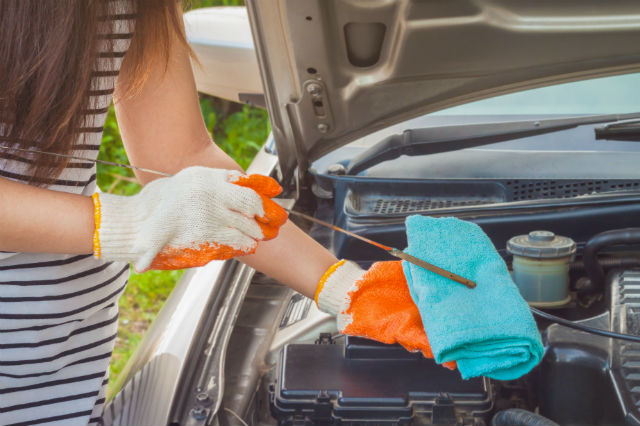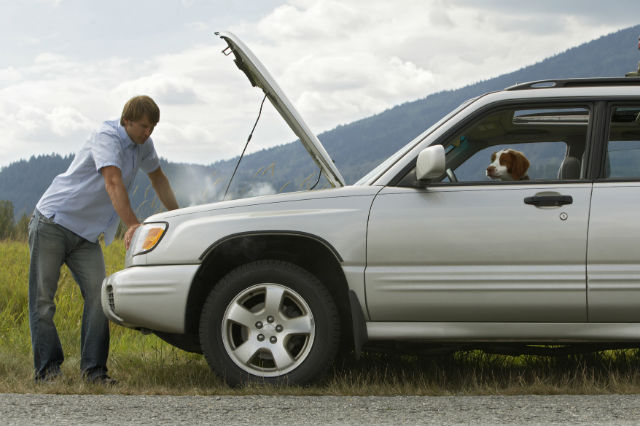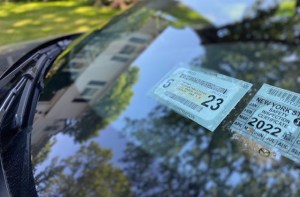Car maintenance goes far beyond bringing in your vehicle for inspections and emissions tests. It entails regularly checking on your car, not just when you have to or when you think there is a problem.
Improper maintenance can decrease the longevity and performance of your vehicle. Additionally, minor problems that could have been fixed easily can turn into major issues that require extensive – and expensive – repairs.
We spoke with Tyler Fournier, diagnostic technician at AAA Approved Auto Repair facility Platinum Auto Service in South Yarmouth, Mass., for his tips on proper car maintenance.
What is the biggest car maintenance myth or misconception?
New vehicles are being built with “lifetime fluids” such as transmission fluid and drive line fluids. The manufacturers say the fluids do not need to be changed for the lifetime of the vehicle, but what they actually mean is the fluid lasts for the lifetime of the component. This could possibly be less than 100,000 miles depending on driving habits. Do not neglect your transmission or differential fluids. Replace fluids and they will be less likely to fail. Always use either manufacturer-specified or high-quality fluids that meet or exceed original equipment specs. We recommend every 30,000 miles for such services.

What’s the most common mistake people make in regards to keeping their car in good shape?
The biggest mistake would be not changing the engine’s oil in a timely manner and not checking the engine oil level between services. Most manufactures are extending their oil change intervals to 7,000 or even 10,000 [miles] in some cases. For the cost of an oil change, and the huge gain your engine feels in the long run, you should always change your oil at 3,000 for standard oil and 5,000 for synthetic oil. If you are bad with maintenance, then run your car with synthetic, it only helps.
Also, the reality is that all engines of today burn some amount of oil. One quart of oil over 1,000 miles is pretty normal. Running your engine low on oil even by one quart can drastically reduce the longevity of your engine and its performance. Check your oil no less than once every 1,000 miles and do not mix oil viscosities or brands.
What causes a car to overheat and what should you do to fix it?
The most common car overheating cause is low coolant levels and neglected cooling systems. If you have a coolant leak, make sure you keep the radiator and overflow full at all times. In some cases, if the coolant level is very low, the engine coolant temp sensor won’t read properly and your engine can overheat. You may not know it is overheating until it is too late.
Do not use water to top if you don’t absolutely have to. If water is used, have your system flushed as soon as possible with fresh coolant.
Flushing your cooling system around every 100,000 miles is the best way to keep your cooling system from getting gunked up due to deteriorated coolant. Coolant does go bad over time. Check your fluid type before adding any coolant. Always use the manufacturer specified fluid type. Universal coolant can cause more issues than it’s worth.
What are your best tips to keep your car in the peak condition?
The best way to keep your car in good shape is to perform maintenance according to both your vehicle’s manufacturer-specified intervals and by recommendations of a good repair shop. Your owner’s manual can tell you when certain maintenance items need to be done. This would be considered minimum maintenance requirements.
To exceed the maintenance requirements, you should find a good repair shop that has your best interests in mind. Most shops are not just out to get your money. The reality is, the better a vehicle is maintained, the easier it will be to work on and the longer it will last. Therefore, everyone wins. Fixing things before they are a major problem can save you time and money and any good repair shop will give you a heads up when things are starting to fail. If you don’t trust your repair shop, do your research online and read reviews to find one you do.
All the tools needed for at-home car maintenance can be purchased at NAPA Auto Parts, where AAA members receive 20% off. If you prefer to let the pros handle it, find a AAA Approved Auto Repair facility near you.
What automotive questions do you have for our mechanics? Let us know in the comments below.
18 Thoughts on “Here’s What Your Mechanic Says Is Damaging Your Car”
Leave A Comment
Comments are subject to moderation and may or may not be published at the editor’s discretion. Only comments that are relevant to the article and add value to the Your AAA community will be considered. Comments may be edited for clarity and length.















I have a 2016 VW Golf GTI, in excellent shape with slightly less than 9,000 miles on it. This year with the pandemic I have been driving even less than normal miles. I have been getting regular annual checkups for it at the dealership in the past. Because I have not even hit the 10,000 mile mark in 4 years, what items, if any, do you recommend I have maintained this year, with still under 9,000 miles? Thank you.
What is it if my car slows then speed limit. This happens fast
I have a 2010 Altima w. 50, 000 mies. Its been sitting for a few months w./o any significant mileage. Any suggestions?
Thanks for reaching out! We covered that topic in another post, linked here: Keep You Car Maintained During a Driving Hiatus
If you have any further questions, let us know!
I purchased a new bulb for the tail light at NAPA, but did not get a discount. I am an AAA member and have been one for years.
I have a 2014 Toyota Rav 4 unlimited and I wanted to change my transmission fluid but the transmission is sealed. I went to my mechanic and he said he does not have the equipment to do such an oil change. I was told it is done by vacuum and heat. Why would a car manufacture do something like this. The car has no dipstick and no drain plug. I would like to know if I drill a hole in the pan and drain the fluid and measure the fluid coming from it can I put another hole in the top of the pan and put Transmission fluid into it if was came out was measured accurately.
Hi, here’s an answer from our Car Doctor John Paul:
Your Toyota, like many vehicles these days, does not have a conventional dipstick. The fluid can still be changed (it does have a drain) and can be refilled. The process is a bit tedious but it can be accomplished. Under normal circumstances there is no need to change the fluid. If you drive under harsh or severe conditions the fluid should be changed at 60,000 miles and I would recommend only Toyota fluid is used.
Thank you for the great article. I have a 2004 suburban that just turned 160000 miles and i have done just what you recommended since the day that i bought it, i have only had to change normal wear and tear items. I really love this car and when the time comes to replace it i will definitely miss it.
You are right! It is a rare sight nowadays to see someone in their own driveway working on their own car!
Thank you. This was a great article. I am already doing everything it suggests. However, it was nice to reinforce everything that I am doing right. I have a 2004 Buick LeSabre, and that car is the car love of my life. I am very fussy about that car!
I remember back in the 1960’s, ‘70’s, and ‘80’s guys were changing oil, air filters, coolant, and spark plugs in their driveways on their day off. And cutting the grass, raking leaves etc. Times have changed. No one wants to do anything anymore.
The difference between now and 30, 40, 50 years ago is that people are working longer and harder at their jobs, or spending their time job hunting. Today, people also realize the importance of spending more time with their families, especially children. And I have seen people cutting grass, raking leaves (although experts advise to leave the leaves where they are for a healthier lawn), and planting gardens. So, it’s not that people don’t want to do anything, it’s that they are doing different things. And there is the local garage that can take care of our cars — we have a great one.
Preventive maintenance for a Camry 2007 with 33000 miles?
Hi Ann, thanks for reading. Here’s an answer from our Car Doctor John Paul:
Even though your car only has 33,000 miles on it, it is 12 years old. The best advice is bring the car to a good repair shop (aaa.com/autorepair) and have them look over the car. In general, oil changes, coolant and brake fluid should be changed. If the tires are original, replace them just due to age. Then look at the brakes, battery, steering and suspension system for wear. The overall inspection may also help find other items that are starting to wear out.
Should battery be disconnected if car is not used in Winter season- 5 months. Does it mess computer system??
Hi Patrick, thanks for reading. Here’s an answer from our Car Doctor John Paul:
Cars, when they are shut off and parked, still have some components that remain powered and will over time discharge the battery. Disconnecting the battery will prevent this, but depending on the vehicle, in addition to resetting the clock, radio presets, seat memory, the computer may need to go through a “re-learn” procedure. In addition, some radios will enter a theft mode, which will require a code to turn back on. The best solution if possible is to install a battery charger designed for vehicle storage. These are commonly referred to as float chargers and one brand is Battery Tender. This will keep the battery charge without overcharging it.
My 2011 Chevy Traverse Radio turns on most mornings with only a tinny low volume sound with no bass at all. After a while it may come back on sometimes only Rt Front Speaker or Left Front And sometimes Both. On very hot days it may start out with normal volume. Any ideas whT’s Causing this problem and does it sound like an expensive fix?
Hi, thanks for reading. Here’s an answer from our Car Doctor John Paul:
The issue at first glance sounds like a faulty connection, perhaps a wire grounding out or even a faulty radio head unit or amplifier. After doing a bit more research it seems as if you are not alone with this problem and replacing the speakers in many cases cures the problem. I would start with having the system checked by an auto stereo store and if necessary replace the speakers with a quality aftermarket set. The new speakers will sound better and may even be cheaper than the GM speakers.